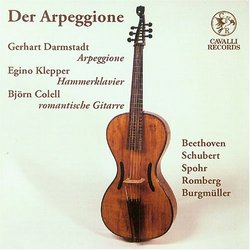| All Artists: Ludwig van Beethoven, Franz [Vienna] Schubert, Vincenz Schuster, Friedrich Burgmuller, Joseph Brodmann Title: Der Arpeggione Members Wishing: 1 Total Copies: 0 Label: Cavalli Original Release Date: 1/1/2006 Re-Release Date: 6/27/2006 Album Type: Import Genres: Pop, Classical Styles: Vocal Pop, Chamber Music, Historical Periods, Classical (c.1770-1830), Instruments, Reeds & Winds, Strings Number of Discs: 1 SwapaCD Credits: 1 UPCs: 675754918026, 4028183002426 |
Search - Ludwig van Beethoven, Franz [Vienna] Schubert, Vincenz Schuster :: Der Arpeggione
 | Ludwig van Beethoven, Franz [Vienna] Schubert, Vincenz Schuster Der Arpeggione Genres: Pop, Classical
|
Larger Image |
CD Details |
CD ReviewsAuthentically authentic instruments, un-virtuosic readings, Discophage | France | 12/17/2006 (3 out of 5 stars) "The arpeggione, a short-lived instrument invented by the Viennese guitar-maker Johann Georg Staufer in 1823 was alternatively called guitarre d'amour, Bogen-Guitarre, Chitarra con arco (bowed guitar), Knie-Guitarre (knee guitar) or Guitar-Violoncell'; the term arpeggione was used only by Schubert and became common usage only upon publication of the score, in 1871. It was a kind of cross between cello and guitar, cello-sized with arched belly and bridge and played with bow, but guitar-shaped and sharing a few technical characteristics with the latter instrument, including 6 strings tuned as the guitar and absence of a soundpost, that small pillar of pine wood placed between the table and the back of violin and cello, which serves to transmit the strings' vibration. I must have ruffled some feelings when, in my review of Anner Bylsma and Jos van Immerseel's recording of Schubert's Arpeggione sonata (paired with the "Trout" quintet on a Sony CD released in 1997, Schubert: Trout Quintet; Arpeggione & Notturno), I contended that Bylsma's use of an early 18th century, 5 stringed piccolo cello was no more "authentic" in this piece than the use of a modern instrument: I got an "unhelpful" vote on that one. But I'll stand firm and maintain that the only "authentic" instrument in Schubert's composition is, indeed, the arpeggione or a copy thereof, and the only one to enable performer and listener to get an idea of how the composer wanted it to have sounded.
There was an excellent recording of Schubert's sonata on LP, made in 1974 by Klaus Storck (playing on an authentic instrument kept in the Berlin Museum of Music Instruments) and Alfons Kontarsky on Archiv Produktion (the early-music branch of DG), coupled with the flute variations on "Trock'ne Blumen" performed by Hans-Martin Linde, but it seems, alas, not to have been reissued on CD. So here is at last on CD an authentically authentic instrument version, and though the liner notes are a bit confusing, Gerhart Darmstadt - born in 1952, he studied baroque cello with Bylsma and period practice with Harnoncourt, and now teaches the latter at the Hamburg Conservatory - appears to be playing the same instrument from the Berlin Museum as Klaus Storck - but only in Schubert's sonata. In the other pieces of the disc, for reasons unexplained, he plays a modern copy of an instrument by the same original maker (Anton Mitteis, a pupil of Staufer) as the one in Berlin, but this one kept in the National Museum of Prag. Anyway, at the hands of Darmstadt the instrument's sound is not as ample as the modern cello, but more gentle, intimate, chamber music like. The pianoforte is discreet and warm-sounding, and commendably free of the toy-piano clanging brittleness that one is used to hearing with period pianofortes or copies thereof. Darmstadt's playing is un-virtuosic, and some of his sedate tempos seem dictated by technical limitation rather than expressive choice (try 1:15 in the finale - track 6 - taken at a stately pace, and compare it to the "flight of the bumblebee" effect produced by Yo-Yo Ma in his Sony recording with Emmanuel Ax - also paired with a fine "Trout" quintet) The fillers are unsubstantial if charming transcriptions - some accompanied by period guitar, enhancing their salon-music character - of pieces by Beethoven, Burgmüller, Spohr and Romberg, the two latter made by Vincenz Schuster himself, one of the early and sole virtuosos of the instrument and first performer of Schubert's sonata. The total timing is a scanty 48:01, so do approach with caution. This disc no more than serviceable then, and I'll keep it my collection only until something better comes along - like a long-due reissue of the Storck recording. " |

 Track Listings (10) - Disc #1
Track Listings (10) - Disc #1